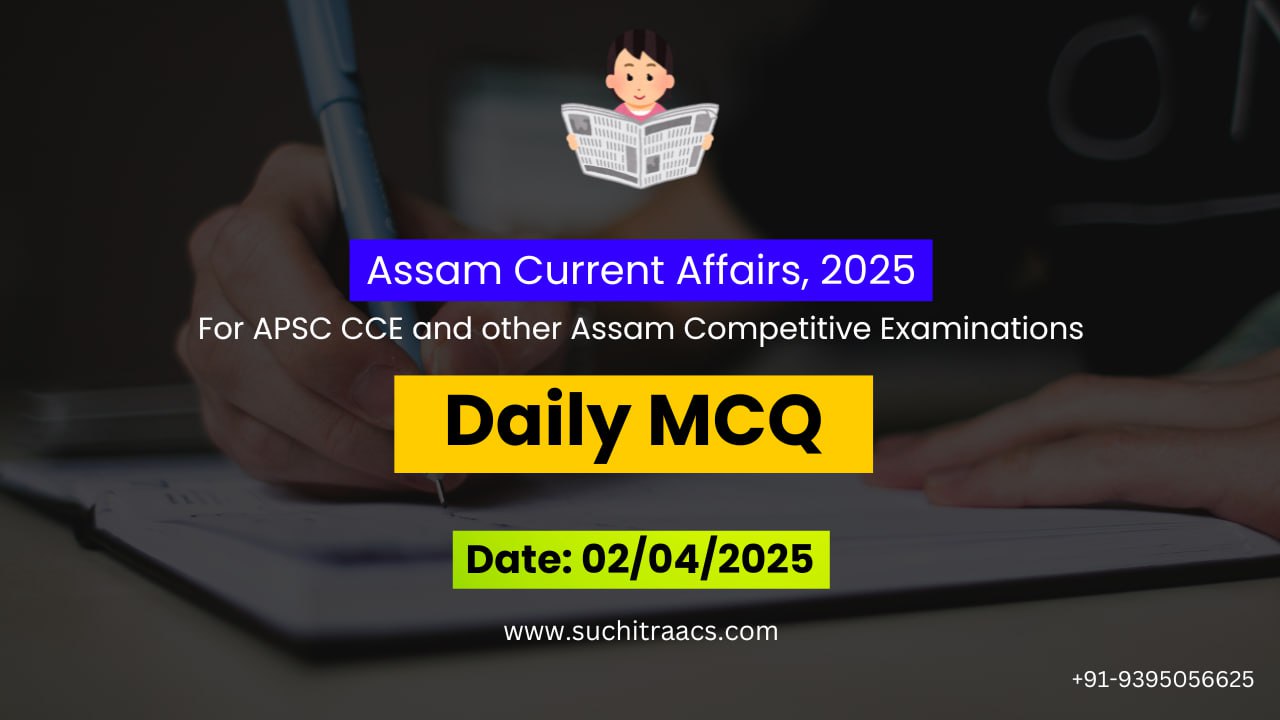APSC MCQs / APSC Prelims Practice Questions based on Assam Tribune (Daily) – 02/04/2025
For APSC CCE and other Assam Competitive examinations aspirants, practicing Daily MCQs is vital. This blog covers most important Prelims questions from the Assam Tribune today (02-03-2025). These issues are key for both APSC Prelims syllabus, offering insights into the important topics of current affairs.
APSC MCQs / APSC Prelims Practice Questions (Date: 02/04/2025)
1. India-China Relations: 75 Years of Diplomatic Ties
📌 GS Paper 2: International Relations, India-China Relations
Q1. Which of the following events marked the formal diplomatic recognition of China by India?
A) Bandung Conference, 1955
B) Panchsheel Agreement, 1954
C) India’s recognition of PRC in 1950
D) Treaty of Peace and Friendship, 1962
🔹 Answer: C) India’s recognition of PRC in 1950
🔹 Explanation: India was one of the first countries to recognize the People’s Republic of China (PRC) in 1950 after the Communist takeover. The Panchsheel Agreement (1954) was later signed to enhance bilateral relations.
Q2. The Line of Actual Control (LAC) between India and China passes through which of the following regions?
- Arunachal Pradesh
- Uttarakhand
- Ladakh
- Himachal Pradesh
Select the correct answer using the codes below:
A) 1 and 3 only
B) 2 and 4 only
C) 1, 2, and 3 only
D) 1, 2, 3, and 4
🔹 Answer: D) 1, 2, 3, and 4
🔹 Explanation: The LAC (Line of Actual Control) is the de facto border between India and China. It passes through Ladakh, Himachal Pradesh, Uttarakhand, Sikkim, and Arunachal Pradesh.
2. India’s Focus on Green Hydrogen for Energy Security
📌 GS Paper 3: Energy Security, Environment
Q3. Consider the following statements regarding Green Hydrogen:
- Green hydrogen is produced using fossil fuels.
- It is a key component of India’s National Hydrogen Mission.
- Hydrogen fuel cells emit carbon dioxide when used in vehicles.
Which of the above statements is/are correct?
A) 1 and 3 only
B) 2 only
C) 1 and 2 only
D) 2 and 3 only
🔹 Answer: B) 2 only
🔹 Explanation:
- Green Hydrogen is produced using renewable energy (solar/wind) and water electrolysis, not fossil fuels.
- National Green Hydrogen Mission (2023) aims to make India a global hub for green hydrogen production.
- Hydrogen fuel cells emit only water vapor, not carbon dioxide.
Q4. What are the key benefits of Green Hydrogen for India’s energy security?
- Reducing reliance on imported fossil fuels
- Decarbonizing industries like steel and cement
- Increasing air pollution in urban areas
Select the correct answer using the codes below:
A) 1 and 2 only
B) 2 and 3 only
C) 1 and 3 only
D) 1, 2, and 3
🔹 Answer: A) 1 and 2 only
🔹 Explanation: Green hydrogen helps reduce dependency on oil and gas imports and decarbonize heavy industries like steel, cement, and fertilizers. It actually reduces air pollution by replacing fossil fuels.
3. India’s Push for a Permanent Seat in the UN Security Council
📌 GS Paper 2: International Institutions, Global Governance
Q5. Which of the following are valid arguments supporting India’s bid for a permanent UNSC seat?
- India is one of the largest contributors to UN peacekeeping missions.
- India has the world’s third-largest economy by GDP (nominal).
- India represents a significant portion of the world’s population.
Select the correct answer using the codes below:
A) 1 and 3 only
B) 2 and 3 only
C) 1 and 2 only
D) 1, 2, and 3
🔹 Answer: A) 1 and 3 only
🔹 Explanation:
- India is one of the largest contributors to UN peacekeeping forces and represents one-sixth of the world’s population.
- However, India is not yet the third-largest economy by nominal GDP (it is 5th as of 2024).
Q6. The “Coffee Club” or “Uniting for Consensus” group is associated with which of the following?
A) Promoting India’s permanent UNSC membership
B) Opposing expansion of the permanent UNSC seats
C) Advocating for environmental sustainability
D) Strengthening South-South cooperation
🔹 Answer: B) Opposing expansion of the permanent UNSC seats
🔹 Explanation: The Coffee Club is an informal group of countries like Italy, Pakistan, Mexico, and South Korea that oppose expanding UNSC permanent membership, blocking India’s bid.
4. Climate Change and Its Impact on India’s Water Security
📌 GS Paper 3: Environment, Water Management
Q7. Which of the following Indian rivers are glacier-fed and at risk due to climate change?
- Ganga
- Brahmaputra
- Godavari
- Indus
Select the correct answer using the codes below:
A) 1, 2, and 4 only
B) 1 and 3 only
C) 2 and 3 only
D) 1, 2, 3, and 4
🔹 Answer: A) 1, 2, and 4 only
🔹 Explanation: Ganga, Brahmaputra, and Indus originate in the Himalayas and are glacier-fed, making them vulnerable to climate change. Godavari is rain-fed, not glacier-fed.
Q8. Which Indian state has recently launched a ‘Climate Resilient Water Management Plan’ to tackle water scarcity?
A) Rajasthan
B) Maharashtra
C) Tamil Nadu
D) Uttar Pradesh
🔹 Answer: B) Maharashtra
🔹 Explanation: Maharashtra has implemented climate-resilient water conservation programs under Jal Yukta Shivar Abhiyan to tackle droughts and climate-induced water scarcity.
5. Supreme Court’s Stance on Governor’s Powers in State Affairs
📌 GS Paper 2: Indian Polity, Federalism
Q9. Which of the following Supreme Court cases dealt with the misuse of Article 356 (President’s Rule) by Governors?
A) Kesavananda Bharati Case (1973)
B) S.R. Bommai Case (1994)
C) Golaknath Case (1967)
D) Minerva Mills Case (1980)
🔹 Answer: B) S.R. Bommai Case (1994)
🔹 Explanation: The S.R. Bommai case (1994) established that Article 356 (President’s Rule) cannot be used arbitrarily and is subject to judicial review.
Q10. Consider the following statements about the powers of the Governor in India:
- The Governor must act on the advice of the Chief Minister in all matters.
- The Governor can dismiss a state government without seeking approval from the President.
- The Supreme Court has ruled that Governors cannot delay state bills indefinitely.
Which of the above statements is/are correct?
A) 1 and 3 only
B) 2 only
C) 1, 2, and 3
D) 3 only
🔹 Answer: D) 3 only
🔹 Explanation:
Statement 3 is correct: The SC ruled that Governors must act within a reasonable timeframe on state bills (Punjab & Tamil Nadu cases).
Statement 1 is incorrect: The Governor can act independently in certain discretionary matters (Article 163).
Statement 2 is incorrect: A Governor cannot dismiss a state government on their own.
 APSC Prelims Crash Course, 2025
APSC Prelims Crash Course, 2025
at most affordable rate in Assam!

🔔 Join Our WhatsApp Study Group!
For exclusive access to premium quality content, including study materials, current affairs, MCQs, and model answers for APSC CCE and other Assam competitive exams.
Click here to join: SuchitraACS Study WhatsApp Group
📚 Want to know more about SuchitraACS’s most affordable courses?
Click here to know more: SuchitraACS Courses for APSC CCE and Assam Competitive Examinations




